Related Research Articles

The Federal government of Nigeria is composed of three distinct branches namely the legislative, executive, and judicial, whose powers are vested and bestowed upon them by the Constitution of the Federal Republic of Nigeria, the National Assembly, the President, and lastly the federal courts, which includes the Supreme Court which is regarded as the highest court in Nigeria respectively. One of the major functions of the constitution is that it provides for separation and balance of powers among the three branches and aims to prevent the repetition of past mistakes made by the government, some other functions of the constitution includes that it divides power between the federal government and the states, and it also protects various individual liberties of the citizens of the nation.
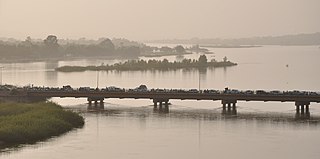
The Niger River is the main river of West Africa, extending about 4,180 km (2,600 mi). Its drainage basin is 2,117,700 km2 (817,600 sq mi) in area. Its source is in the Guinea Highlands in south-eastern Guinea near the Sierra Leone border. It runs in a crescent shape through Mali, Niger, on the border with Benin and then through Nigeria, discharging through a massive delta, known as the Niger Delta, into the Gulf of Guinea in the Atlantic Ocean. The Niger is the third-longest river in Africa, exceeded by the Nile and the Congo River. Its main tributary is the Benue River.

Creole peoples may refer to different ethnic groups around the world. The term has been used with various meanings, often conflicting or varying from region to region.

Nnamdi Benjamin Azikiwe, PC, usually referred to as "Zik", was a Nigerian statesman and political leader who served as the ceremonial first president of Nigeria during the First Nigerian Republic which existed from 1963 to 1966. Considered a driving force behind the nation's independence, he came to be known as the "father of Nigerian nationalism".

The Oba of Benin is the traditional ruler and the custodian of the culture of the Edo people and all Edoid people. The then Kingdom of Benin has continued to be mostly populated by the Edo.

Ondo State is a state in southwestern Nigeria. It was created on 3rd of February 1976 from the former Western State. It borders Ekiti State to the north, Kogi State to the northeast, Edo State to the east, Delta State to the southeast, Ogun State to the southwest, Osun State to the northwest, and the Atlantic Ocean to the south. The state's capital is Akure, the former capital of the ancient Akure Kingdom. The State includes mangrove-swamp forest near the Bights of Benin.
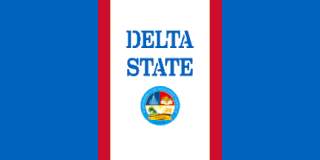
Delta State is a state in the South-South geopolitical zone of Nigeria. Named after the Niger Delta—a large part of which is in the state—the state was formed from the former Bendel State on August 27, 1991. Bordered on the north by Edo State, the east by Anambra and Rivers States, and the south by Bayelsa State across the Niger River for 17 km and the Forçados River for 198 km, while to the west is the Bight of Benin which covers about 160 kilometres of the state's coastline. The State was initially created with 12 local government areas in 1991 which was later extended to 19 and now has 25 local government areas. Asaba as its state capital is located along the River Niger on the northeastern end of the State, while the state's economic centre is the twin cities of Warri and Uvwie
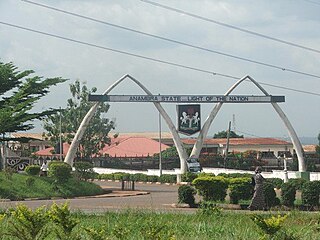
Anambra State is a Nigerian state, located in the southeastern region of the country. The state was created on 27 August 1991. Anambra state is bounded by Delta State to the west, Imo State to the south, Enugu State to the east and Kogi State to the north.
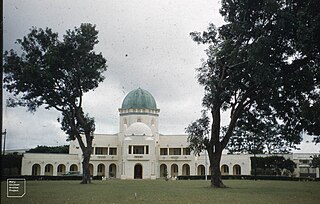
Kaduna is the capital city of Kaduna State, and the former political capital of Northern Nigeria. It is located in north-western Nigeria, on the Kaduna River. It is a trade centre and a major transportation hub as the gateway to northern states of Nigeria, with its rail and important road network.
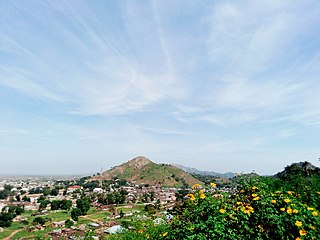
Plateau State is the twelfth-largest Nigerian state. It’s located near the centre of Nigeria and includes a range of hills surrounding the Jos Plateau, its capital, and the entire plateau itself.

Nigerian literature may be roughly defined as the literary writing by citizens of the nation of Nigeria for Nigerian readers, addressing Nigerian issues. This encompasses writers in a number of languages, including not only English but Igbo, Urhobo, Yoruba, and in the northern part of the county Hausa and Nupe. More broadly, it includes British Nigerians, Nigerian Americans and other members of the African diaspora.

The decolonisation of Africa is a process that largely took place from mid-1950s to 1975 during the Cold War, with radical government changes on the continent as colonial governments made the transition to independent states. The process was often marred with violence, political turmoil, widespread unrest, and organised revolts in both northern and sub-Saharan countries including the Mau Mau rebellion in British Kenya, the Algerian War in French Algeria, the Congo Crisis in the Belgian Congo, the Angolan War of Independence in Portuguese Angola, the Zanzibar Revolution in the Sultanate of Zanzibar, and the Nigerian Civil War in the secessionist state of Biafra.

Edo, officially known as Edo State, is a state located in the South-South geopolitical zone of the federal republic of Nigeria. As of 2006 National population census, the state was ranked as the 24th populated state (3,233,366) in Nigeria. The state population figures is expected to be about 8,000,000 in 2022. Edo State is the 22nd largest State by landmass in Nigeria. The state's capital and largest city, Benin City, is the fourth largest city in Nigeria, and the centre of the country's rubber industry. Created in 1991 from the former Bendel State, is also known as the heart beat of the nation. Edo State borders Kogi State to the northeast, Anambra State to the east, Delta State to the southeast and southsouth and Ondo State to the west.
Yenagoa is a Local Government Area and capital city of Bayelsa State, southern Nigeria. It is located at the southern part of the country at coordinates 4°55′29″N6°15′51″E.

British West Africa was the collective name for British colonies in West Africa during the colonial period, either in the general geographical sense or the formal colonial administrative entity. British West Africa as a colonial entity was originally officially known as Colony of Sierra Leone and its Dependencies, then British West African Territories and finally British West African Settlements.
The Economic history of Nigeria falls into three periods. They are the: pre-colonial, the colonial and the post-colonial or independence periods. The pre-colonial period covers the longest the part of Nigerian history. The colonial period covers a period of 60 years,1900-1960 while the independence period dates from October 1, 1960.
Matilda Kerry is a physician and TV presenter, currently a co-host on the Nigerian version of The Doctors. She first achieved national fame as the winner of the Most Beautiful Girl in Nigeria in 2000.
The Ogba people are one of the ethnic groups in Rivers state. The Ogba people speak the Ogba language. The Ogbas reside in a local government called Ogba-Egbema-Ndoni in Rivers state Nigeria. The Ogba language has three dialects namely; Usomini, Igburu, Egi dialect. The Ogba kingdom is made up of three clans which includes; Egi, Igburu, Usomini clans, and its largest urban town is Omoku. Ogba people speak two dialects of the Ogba languages, the Egi and Igburu. Eligbo and Ukporomini are two Ogba communities in Ahaoda East Local Government Area, while Itu II in Emohua LGA also speaks Ogba language.
The Federal University Otuoke is a Federal Government-owned University sited in Otuoke, a town in Ogbia local government area of Bayelsa State, Southern Nigeria. The university is one of the nine new Federal Universities established by the Federal Government of Nigeria in February 2011 under the administration of president, Dr Goodluck Jonathan. Federal University Otuoke is sited in the heart of the oil-rich Niger-Delta Region of Bayelsa State. The university was established in 2011 and started with 282 pioneer students. The university has six (6) faculties and offers degree courses at undergraduate levels. The undergraduate courses are in the faculty of Science, Management Science,Social Science and Humanities, Education, Engineering and Technology. The university is a Partner of Sustainable Public Procurement. In November 2020, Prof. Teddy Charles Adias was appointed Vice Chancellor of the university
References
- ↑ "The Moroccan Nationalist Movement and its Anticolonial Activism from 1925 to 1944".
- ↑ Bodetti, Austin (2021-11-01). "Italy's Little-Known Colonial Legacy in Libya and Somalia". Inside Arabia. Retrieved 2022-08-04.
- ↑ "Eswatini - Colonial administration | Britannica". www.britannica.com. Retrieved 2022-08-04.
- ↑ "Burundi | South African History Online". www.sahistory.org.za. Retrieved 2022-08-04.
- ↑ CORRESPONDENT, Michael Coard TRIBUNE. "'94 Rwanda massacre exposes Europe's murderous African colonization". The Philadelphia Tribune. Retrieved 2022-08-04.
- ↑ Tognina, Andrea. "Swiss in Algeria: decolonisation in a country without colonies". SWI swissinfo.ch. Retrieved 2022-08-04.
- ↑ "About Nigeria - Nigeria High Commission". nigeria.org.my. 2020-09-11. Retrieved 2022-08-04.